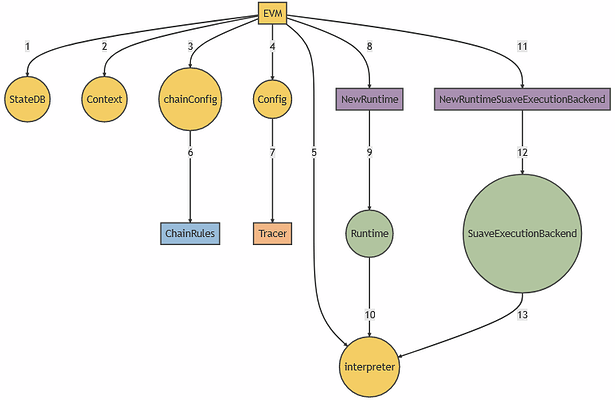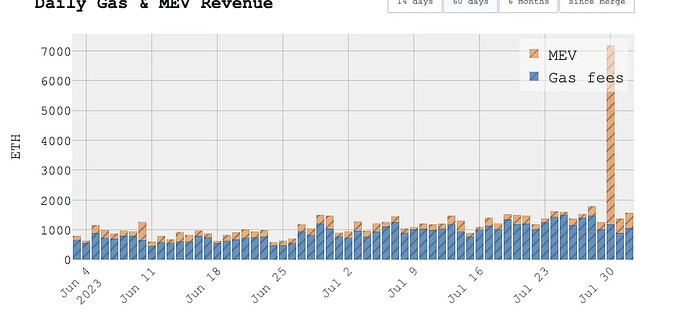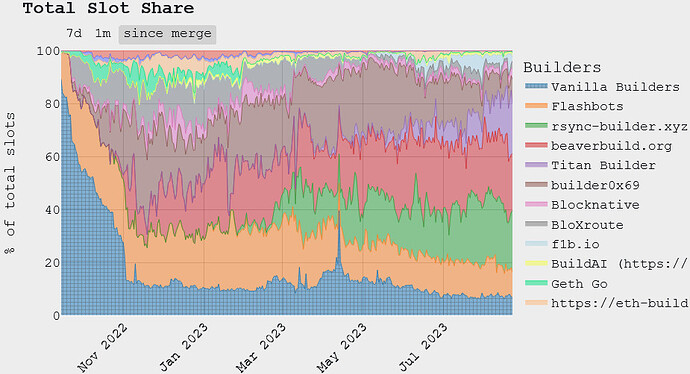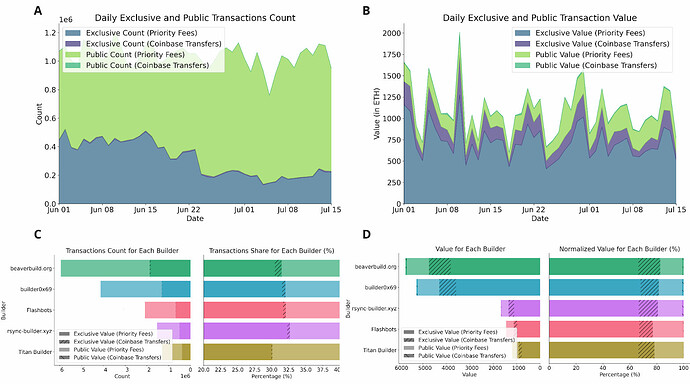Over the past few weeks, we’ve made substantial progress in several areas of research and development. We’ve published additional resources on SUAVE, including an introduction to the MEVM and the open-sourcing of suave-geth. We’ve also open-sourced MEV-Share Node, published new searching guides and hosted a CTF for searchers. Additionally. Flashbots Protect has received a significant upgrade to speed up private transactions through optional orderflow sharing. Finally, as we approach the one-year anniversary of the Merge, the PBS ecosystem around MEV-Boost is set to enter a new phase as well with the recent proposal of PBS Guild.
Before we dive into the report, I want to mention a quick housekeeping item for frequent readers: The resource list at the end of these reports has been separated into The MEV Letter; a weekly summary from the broader MEV ecosystem. The Transparency reports will continue to be published and contain the latest developments, research, discussions, and events related to Flashbots.
Subscribe to The MEV Letter and get notified when new Transparency Reports are published.
SUAVE Centauri 
Last month @bert published The MEVM, SUAVE Centauri, and Beyond which previews the SUAVE Centauri release and introduces the MEVM. The MEVM is a powerful modification of the EVM with new precompiles for MEV use cases that greatly lower the barriers to create new MEV applications. This will allow developers to rebuild the centralized off-chain MEV infrastructure of today, like block building and OFAs, into smart contracts on SUAVE. Being able to deploy these applications on a decentralized protocol with low latency, programmable privacy, credible computation, and composability will open up a field for innovation, making SUAVE a market for mechanisms.
The post further presents our plan to launch a SUAVE Devnet in Q4 to enable community experimentation before launching a mainnet as a part of SUAVE Andromeda. We look forward to the community building, and stress testing SUAVE alongside us. If you’re operating MEV infrastructure or conducting research in these domains – join the conversation and help us understand your requirements for SUAVE!
Open sourcing suave-geth
We’ve open-sourced the current state of suave-geth, the client that will power SUAVE and the MEVM ecosystem. By building SUAVE in the open we hope to catalyze community experimentation, invite constructive criticism, and gather feedback that will shape the evolution of SUAVE.
As an example of how the MEVM will work, we’ve published a Simple MEV-Share Walkthrough defined via smart contract on SUAVE. The walkthrough demonstrates how to i) Deploy an implementation of MEV-Share, and a block builder as smart contracts, ii) Send and match MEV-Share bids, iii) Build blocks and send them to a relay.
We will be releasing additional resources over the coming months. In the meantime, check out SUAVE smart contract programming model: TEE-based smart contracts for block building by @socrates1024 which provides a quick outline of the MEVM, TEE deployment, and the potential for apps built on top of SUAVE. See also the SUAVE wiki, TEE/SGX wiki among others wikis initiated by @quintus, and join the conversation here on the forum!
Additional functionalities of the MEVM compared to stock EVM. From suave-geth README
Flashbots Protect and MEV-Share
Orderflow sharing
Flashbots Protect has received a significant upgrade to make private transactions faster. From the advanced menu in the Protect docs users can now selectively share their transactions with additional builders through the Protect RPC.
As the builder market becomes more decentralized, opting into additional builders will result in much faster inclusion times. Orderflow sharing is key to decentralized block building and we are excited to take the first step in unlocking its benefits for Protect users.
All participating builders will protect users transactions according to a set of Fair Market Principles defined by the Decentralized Orderflow Working Group. These principles include pre-trade and failed-trade privacy, transparency, bundle atomicity, and other guarantees.
Open sourcing MEV-Share Node
Our implementation of MEV-Share Node (f.k.a. Matchmaker) has been open-sourced and MEV-Share is now entirely built in the open! This includes protocol specification, node implementation, client library and example bots. We hope that the open sourcing of MEV-Share Node will further promote transparency and innovation in orderflow auctions.
A new series of searching guides has recently also been published as part of our documentation for MEV-Share. These guides cover topics such as; setting up a new bot, how to listen to events, sending limit order bundles, and debugging. It’s a great place to start if you’re new to MEV-Share and would like to get up to speed on becoming a searcher, no prior searching experience is needed. You’ll come out of the guides with a fully functional bot that you can run today!
These guides are the first of a new series that will explore more advanced techniques. Let us know what you want to see next!
MEV-Share CTF 
Throughout the weekend of August 5-7th we hosted a Capture The Flag event via MEV-Share on Goerli. The CTF consisted of 10 flags of varying difficulty that could be activated by specific transactions or bundles. Over 300 searchers registered for the event and 61 searchers captured at least one flag!
All addresses that captured a flag received a commemorative chest of gold. To celebrate a couple of searchers that impressed us we also created a set of special badges. The badges are non-transferrable, burnable, and awarded on Goerli + mainnet.
Check out the leaderboard and Dune dashboard for a deeper dive into the results. See also the fantastic write-up by minaminao on each of the challenges in the CTF.
Badges from the MEV-Share CTF.
MEV-Boost
Following the cascading events of the Vyper exploit on July 30th, arbitrageurs were competing to clear out the price difference on the de-pegged assets across Curve pools. As a result, the 24-hour amount of MEV paid to validators spiked to a new all-time high of 6006 ETH. During this turmoil a single transaction paid 570 ETH for inclusion, the second highest so far in Ethereum history, topped only by the whitehat rescue performed by c0ffeebabe.eth.
All-time high MEV revenue for validators. From mevboost.pics
Emerging trends in the builder market
The market share across builders has remained relatively stable since the last report. The total number of builders landing blocks per week is around 30 with the top 5 builders winning around 80% of blocks. We might however begin to see a trend of integrated builder-searchers taking market share from other builders by capturing top-of-block MEV through CEX-DEX arbitrage as investigated by SMG.
Builder diversification since the Merge. From mevboost.pics
A deeper dive into the features and strategies used by builders is presented in the Empirical analysis of Builders’ Behavioral Profiles (BBPs) by Thomas Thiery. The post looks at empirical data and introduces a collection of metrics used to outline how builders build blocks and act in the MEV-Boost auction.
These BBPs include metrics such as bid timing, bid cancellations, latency optimizations, order flow access, and MEV strategies, offering insights into the strategies and optimizations used by builders. The research found that exclusive orderflow represent 25 - 35% of the total transaction count, but 80% of the total value paid to builders.
Public and exclusive transaction count and value transferred to builders. From Empirical analysis of Builders’ Behavioral Profiles (BBPs)
PBS Guild Proposal
Research related to in-protocol PBS, ePBS, has been spearheaded by the Ethereum Foundation since the Merge. Concurrently, the development of out-of-protocol PBS, in the form of MEV-Boost, has been a collective effort involving MEV-Boost core maintainers and a growing number of relay operators.
The need for relays in the current out-of-protocol PBS ecosystem was initially thought of as a temporary solution until ePBS R&D catches up. However, as highlighted during PBS.salon and in Relays in a Post e-PBS world, relays will most likely continue to play a role in ePBS.
Despite relays providing a critical service in the MEV-Boost ecosystem, they have been unaccounted for as an economic actor. To support the present and future research, development, and operations of PBS on Ethereum; PBS Guild has been jointly proposed by the MEV-Boost community.
The proposal presents PBS Guild as a non-commercial ecosystem R&D funding vehicle, supporting both individual contributors and projects. The initial phase of PBS-Guild aims to raise $1M to allocate to grantees for independent relays, PBS R&D, data transparency, and PBS education. The primary funding source for the PBS Guild will be donations from key beneficiaries of the PBS ecosystem.
Flashbots builder including reverting transactions in blocks
On August 9 one of Flashbots’ builders began erroneously including reverted transactions in blocks. Over a period of approximately 2 hours, the affected Flashbots builder landed 722 reverted transactions that were not intended to be included onchain. This resulted in users losing approximately 10.2261 ETH in gas fees. See the full disclosure by @shea for additional details on timeline, root cause, and mitigations.
MEV-Boost development and discussions
mev-boost-relay
Our open-source implementation of a MEV-Boost relay has received a couple of updates since the last report. These updates include significant performance improvements related to block submission and validation. Major improvements have also been made to Redis performance and a reduction in the number of simulations. See the release notes below for a more comprehensive list of changes:
builder
Two new block building algorithms have been introduced to the Flashbots builder: Greedy Buckets and Total Profit. The former builds blocks using max effective gas price and profit, while the latter uses max profit. Builders can try out these algorithms via the flags described in the README.
A new feature has also been added to the Flashbots builder to discard failed transactions from bundles when they’re specified as reverting transaction hashes. Previously the builder would stop processing and discard the whole bundle on failure. This new toggle allows continued processing, provided it’s specified as a transaction that can revert in the request.
Mempool-dumpster by @metachris and @0x416e746f6e is a WIP application that dumps mempool transactions from execution layer nodes and archives the content in Parquet and CSV format.
Web3-data-tools by @andres is a library with three classes/functions:
- A web3 wrapper to handle multiple RPCs in case one of them fails.
- A class to map block_number → timestamp
- A Python implementation of the interpolation search algorithm which can be useful to find a block number at a given point in time.
On August 17th, the 6th MEV-Boost call was hosted by @ralexstokes inviting stakeholders and the wider community of MEV-Boost. Several areas of discussion were covered including specification and implementation details of the upcoming Deneb/Cancun upgrade, updates on optimistic relay, and PBS emulation. To wrap it up @tina gave an overview of the PBS Guild proposal, following up on the discussion on relay funding in the previous community call.
Keep an eye on the forum, and the Flashbots Collective calendar to get notified of upcoming calls!
Research and discussions
FRP Year in Review
@sarah.allen posted a year in review of Flashbots Research Proposals, outlining the goals and methodology for FRPs and highlighting the research funded over the last year. The FRP program has supported a wide range of external research in the past year, such as private mempools, the impact of frontrunning, AMM design, auction design, PBS, credible commitments, and more.
Flashbots has actively been supporting the MEV research community through FRPs for the past three years and we are excited to continue! The program has helped us engage with numerous researchers we admire and enabled us to support a wider spectrum of important work. If you’re interested in learning more about FRPs and applying for a grant, explore the FRP process and submit a proposal!
Thank you to all current and former Flashbots Fellows!
FRP-10: Distributed Blockbuilding networks via secure knapsack auctions
@mikerah has published the results from their work on constructing distributed block builder networks using a secure knapsack solver. The research looks at two approaches, one using dynamic programming techniques and the second using a greedy algorithm. The research further explores ways to make these solutions secure and private through MPC.
FRP-24: Quantifying MEV on L2s
@Eru_Iluvatar and @0xpanoramix have concluded their work of quantifying MEV on Polygon, Arbitrum and Optimism. The research found that $213M has been extracted on Polygon, and while the amount of MEV on Arbitrum and Optimism has historically been lower, it’s growing fast.
FRP-31: Threshold Encrypted Mempools: Limitations and Considerations
@AntoineR and @quintus have finished their work investigating the market and incentive implications of using threshold encrypted mempools as techniques to mitigate the negative externalities of MEV. The research dives into various areas of consideration related to encrypted mempools, such as economic inefficiencies, undetectable collusion and censorship.
[Re]distribution study circle
Redistribution.salon was hosted by @guayabyte and @sarah.allen during MEV Week Paris with a focus on the social and philosophical aspects of economic fairness on Ethereum. The participants of the salon explored the broader goals and potential societal impacts of economic proposals related to blockchains and MEV. The salon also included an introductionary discussion to various governance structures and voting mechanisms used by organizasions in the space.
[Re]distribution study circle, session 3, august 2023: universal basic income.
In the fourth redistribution study circle the conversation revolved around universal basic income, diving into case studies and exploring what role UBI can play in a collective, and in society more broadly.
If you would like to join these calls and discuss a specific topic related to redistribution and governance, please add your thoughts to the forum thread!
Events, talks & podcasts
EthCC[6] and MEV Week
Throughout the week of EthCC[6] Flashbots participated in discussions, panels, and various side events in Paris. On July 22, we curated PBS.day at Modular Summit together with Celestia and Maven11. The conference brought together leading PBS researchers to present and discuss the latest research and developments.
We also invited the community to a series of salons hosted at our Pi-rate ship to dive deeper into specific areas of research such as orderflow, censorship and redistribution. During the salon focused on orderflow, the need for transparency and standardization in the MEV supply chain was discussed. Following the event the Data Transparency Working Group, spearheaded by @sajz, was formed to continue the conversation. If you operate infrastructure in the MEV supply chain or are conducting research in this field – join the working group and share your thoughts!
Besides PBS.day and the Pi-rate ship salons, we hosted a couple of challenges for builders and researchers in ETHGlobal Paris and Augmenthack.xyz. More information on the challenges, winners, and takeaways can be found in the posts below.
Thank you to all who participated and congratulations to the winners!
For a comprehensive overview of all MEV-related content that took place during the week of EthCC; see MEV-Week Paris.
Other events and talks
- Recordings from the CredibleCommitments.WTF-event hosted by @sxysun have now been uploaded. The event focused on practical implementations of cooperative AI on top of cryptoeconomic/cryptographic credible commitment devices.
- MEV - Qué es y cómo afecta a los usuarios de Ethereum by ETH•KIPU invited @fiiiu for a discussion, in Spanish, on the concept of MEV and how it affects Ethereum users.
- @socrates1024 and @alex participated in Crypto Lounge Experience and hosted two sessions on “Understanding Privacy Technologies through the lens of MEV”.
- Uncommon Core 2.0 with @Hasu has returned with new co-host @Jon to dive into the technologies and incentives behind public blockchains, with a focus on MEV, blockchain security, and the rollup ecosystem.
Upcoming events
- The MEV Workshop at the Science of Blockchain Conference 2023 (MEV-SBC ’23) is a full-day workshop at Stanford University on August 31. The event aims to highlight important MEV research done in the past year and talks that will illuminate a new round of research problems the community should prioritize.
![]() In order to stay up to date on any upcoming events feel free to subscribe to the Flashbots Collective calendar!
In order to stay up to date on any upcoming events feel free to subscribe to the Flashbots Collective calendar!
Get involved 

At Flashbots, we research and build systems around MEV, and we would love to collaborate with you. We are a distributed organization with the principles of a pirate hacker collective, with several open positions. We also issue grants to external researchers doing work aligned with ours, please find out more in our Research repository. Make sure to also look around on our forum and join the conversations!
Since the last Transparency Report, six editions of The MEV Letter have been published with resources from the broader MEV ecosystem:
The MEV Letter #0
The MEV Letter #1
The MEV Letter #2
The MEV Letter #3
The MEV Letter #4
The MEV Letter #5
Previous Transparency reports
Subscribe to The MEV Letter and get notified when new Transparency Reports are published!




